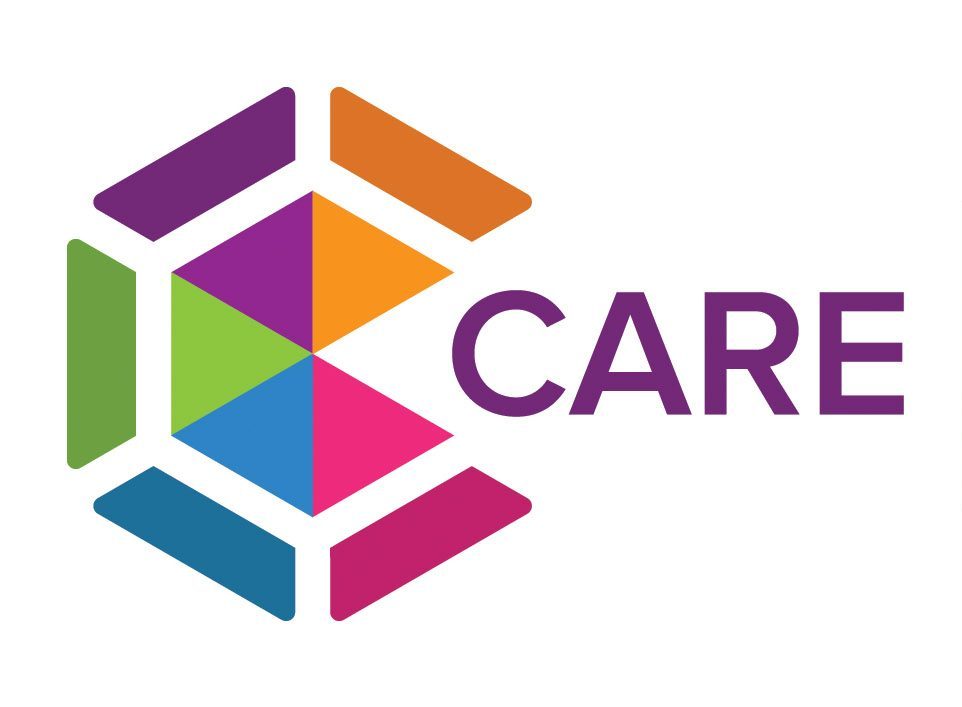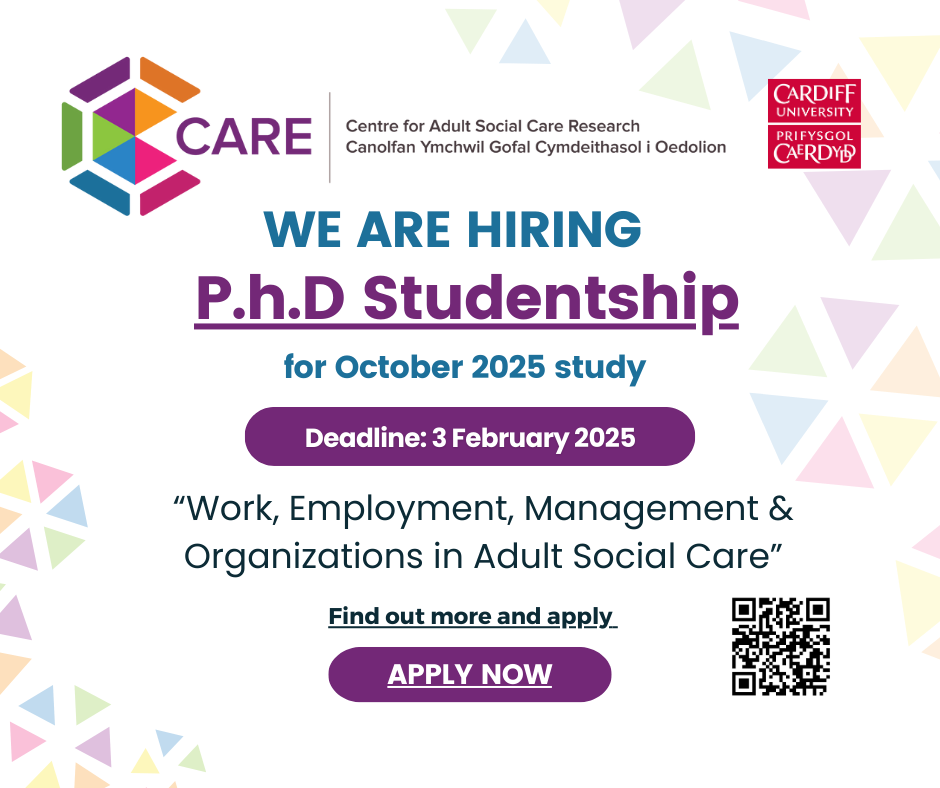CARE and Cardiff Business School PhD Studentship – Work, Employment, Management & Organizations in Adult Social Care
*Deadline: 3 February 2025*
Cardiff Business School is delighted to offer an exciting opportunity for a fully funded PhD studentship at Cardiff University, starting in October 2025, as part of the newly established CARE Centre.
The Centre for Adult Social Care Research (CARE) is based on advancing multi-disciplinary expertise and cutting-edge research in adult social care and is funded by Health and Care Research Wales and Cardiff University and is located within SPARK/SBARC (Social Science Park). The PhD studentship will be situated within Cardiff Business School and will focus on examining issues relevant to adult social care with a broad focus on work & employment, management and organizations.
Outline
For a number of years, the adult social care workforce has frequently been described as being in ‘crisis’ (Health Foundation 2023). This crisis links to persistent labour shortages evidenced in data on recruitment, retention and turnover. In 2023, Skills for Care reported that vacancy rates in England were 9.9%, considerably higher than the rate of 3.4% for the wider economy. The turnover rate of directly employed staff working in the adult social care sector was 28.3% in 2022-23. This equates to approximately 390,000 people leaving their posts over the course of the year (Skills for Care 2023). This crisis is seen to pre-date the COVID pandemic, but exacerbated by it and explanations emanate from employment degradation linked to pay and conditions of work within the sector. These include the relatively low rates of pay compared to other sectors, precarious employment contracts, long working hours and unsociable hours. Nevertheless, care work is often depicted as a paradox; despite deleterious employment conditions, care workers report their work as being highly rewarding and meaningful. This PhD call offers an opportunity to explore further some of the ‘grand-challenges’ facing this sector in relation to the nature of work and employment as well as in the management and organization of care. In so doing, there is a potential to contribute to an important growing public debate about the future of care. This includes exploring further the nature of these challenges as well as potential solutions and innovations which can include a range of topic areas such as:-
- Sustainability in forms of work and employment and organizational forms
- Technological innovations and developments in care work
- Innovations in organizations – including micro-enterprises, cooperative and employee owned businesses
- Exploring the links between work, employment and organization in care and those who draw on care and support
- Equality, Diversity and Inclusion in care work
These areas can draw upon the following themes:-
Work – to examine the nature of work within care can including drawing upon a number of theoretical debates and concepts including skill, job quality, decent work, emotion work and dirty work. Of note, work within adult social care is often presented as homogenous whereby there is opportunity to further explore diversity in different forms of work in the sector which better reflects the range of skills, nature of job quality and types of emotion work and dirty work.
Workforce & Equality, Diversity and Inclusion – to examine the profile of the workforce including equality, diversity and inclusion through exploring issues of gender, ethnicity, aging, sexuality and disability within the care workforce. For example, men and younger workers are under-represented in the workforce, whilst international recruitment into the sector is increasing.
Employment – to explore employment conditions within the sector – including issues such as working time, precarity, pay and pensions. As well as themes related to human resource management scholarship including innovations into recruitment – e.g. values-based recruitment and approaches to retaining staff and reducing turn-over rates. Studies could also include focusing on specific types of employment such as personal assistants, care home staff, service managers.
Organizations – to examine issues of organizational context including a focus on care delivery within different types of care setting including care homes, domiciliary care, as well as the potential for innovative approaches how care is organised such as micro-enterprises, through personal budgets, care cooperatives and employee-owned businesses.
Management – to explore issues of management approach and leadership styles within the sector, including the relevance of levels of management such as supervisory as well as senior management. Here studies could also further examine issues of control and autonomy, teamwork as well as the nature of leadership.
Innovations – to explore innovative methods of service delivery including the application of new technology as well as examining innovative approaches in how work is designed, organised and managed. This focus can also include the links between innovations and those who draw on care and support.
How to apply:
To apply for this studentship, candidates must be eligible for Home fees status.
A completed online application form for doctoral admission in Cardiff University should be submitted via our online application portal. This must be received by the deadline of 12.00pm GMT on 3rd February 2025. In the funding source section please enter “CARE studentship”.
Incomplete applications, applications sent via email, ‘register your interest’ or applications received after the deadline will not be considered.
The application must contain the following documents:
1. Covering letter (two pages maximum)
2. Degree certificates and Transcripts (including translations if applicable)
3. Two academic/professional references. Candidates must approach referees themselves and include references with their application
4.Academic CV: maximum two pages.
5. Research Proposal: The following headings are suggested:
- Title, aims and purpose of the research;
- Brief overview of the academic literature relevant to your field;
- Proposed design/methods;
- Academic contributions of your research;
- Bibliographic References.
Funding Notes
Studentship Awards commence in October 2025 and will cover your home tuition fees as well as a maintenance grant (currently £19,237 p.a. for 2024/25 for full-time students); and includes access to an additional Research Training Support Grant (RTSG). If you have a disability, you may be entitled to a Disabled Students’ Allowance (DSA) on top of your studentship. For further information about eligibility and how to apply, please read the project details.
References
Applications are invited from exceptional candidates with a first class or strong upper second class honours degree, and preferably an appropriate Master’s degree. Students with non-traditional academic backgrounds are also welcome to apply.
Cardiff University is committed to supporting and promoting equality and diversity and to creating an inclusive environment for all. We welcome applications from all members of the global community irrespective of age, disability, sex, gender identity, gender reassignment, marital or civil partnership status, pregnancy or maternity, race, religion or belief and sexual orientation.
Preference will be given to candidates who hold a relevant research training Masters degree (or an equivalent background in research training) for entry onto a three year, full-time doctoral study (or its part-time equivalent) programme but consideration may be given to strong applications for a ‘1+3’ programme (i.e. one full time year of research training Masters followed by three years of full-time Doctoral study).
To apply for this studentship, candidates should be eligible for Home fee status.

